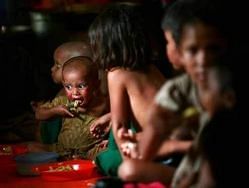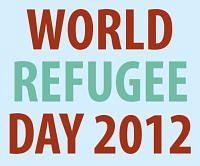Human Rights Analysis
Refugee Day Special
Refugee has no choice, You do
Safe refuge for rohingyas: Obligation under International Law
Mostafa Mahmud Naser
 |
PHOTO: dvb.no |
Recent Rohingya exodus of people fleeing violence and ethnic strife in Myanmar's Rakhine State to Bangladesh exposed deep concern among human rights organizations, intergovernmental bodies, and civil societies. While these bodies repeatedly appealing to Bangladesh to ensure safe sanctuary for Rohingya refugees, Bangladeshi security forces are pushing back the refugee boats when they arrive on the territory of Bangladesh. Foreign Minister Dr. Dipu Moni said in parliament that it is not in the country's best interest to allow more Rohingyas into the country while Bangladesh is already burdened with Rohingya refugees, and many of them are involved in subversive and militant activities. Refuting any international obligation for their protection she claimed: “Bangladesh never signed any kind of international act, convention or law for allowing and giving shelter to refugees…. That's why we are not bound to provide shelter to the Rohingyas.”
Though not a party to the 1951 Refugee Convention, Bangladesh has ratified a number of major international human rights instruments including UDHR, ICCPR, ICESCR and CAT. The basic customary international laws applicable to refugees are found in these human rights treaties. Importantly, the majority of the provisions in these instruments apply to all individuals in the territory of a state, irrespective of their nationality. These instruments expanded countries' protection obligations towards refugees beyond the 1951 Refugee Convention framework, under which one cannot be returned to his or her country of origin because of risk of arbitrary deprivation of life, torture, or cruel, inhuman or degrading treatment or punishment.
The fundamental principle of non-refoulement i.e. the prohibition on return to torture, cruel or inhuman or degrading treatment or punishment enunciated in the Refugee Convention is widely regarded as part of customary international law and has counterparts in human rights law known as 'complementary protection'. Complementary protection is the generic name which results from international legal obligations not to return a person to serious ill-treatment such as torture, cruel, inhuman and degrading treatment or punishment. The obligations to grant complementary protection mainly arise under article 3 of the 1984 Convention against Torture and Other Cruel, Inhuman or Degrading Treatment or Punishment (CAT) and Articles 6 and 7 of the ICCPR, among other instruments. The CAT is one of the most widely ratified and broadly implemented treaties in international human rights law. The Convention applies to persons who fear torture, regardless of whether the person has committed a crime or entered a country illegally. Article 3 of CAT prohibits parties from returning, extraditing or refouling any person to a state "where there are substantial grounds for believing that he would be in danger of being subjected to torture". Thus, Rohingyas who in the face of 'inhuman or degrading treatment or punishment' under relevant provisions of CAT and ICCPR should receive protection in Bangladesh if rejection at the border might lead to them suffering torture or cruel, inhuman or degrading treatment or punishment.
At its core, the Constitution of Bangladesh also upholds the dignity of the individual. Its central plank is the guarantee that the life and liberty of the individual are protected. Not only is the life of a citizen of Bangladesh guaranteed, but everyone who inhabits the terrain of this country is assured of protection in respect of life and liberty. Article 25 of the Constitution states that “the State shall base its international relations on the principles of respect for .... international law and the principles enunciated in the United Nations Charter”. The UN Charter, in its preamble, specifically refers to the reaffirmation of “faith in fundamental rights, in the dignity and worth of the human person, in the equal rights of men and women and of nations large and small”. The Charter in its Articles of 1, 55 and 62 reiterates the observance of human rights for all peoples of the world.
Both international law and constitutional provisions of Bangladesh confers obligation on Bangladesh to extend complementary and temporary form of protection to the Rohingya refugees. Such obligation is, however, temporary and lasts only as long as the threat of torture exists.
The author is Assistant professor, Department of Law, University of Chittagong.

UN Secretary-General's Message for 2012
More than 42 million people around the world have been forcibly displaced from their homes and communities. More than a million fled their countries in the last eighteen months alone due to a wave of conflicts, in Côte d'Ivoire, Libya, Mali, Somalia, Sudan and Syria. These numbers represent far more than statistics; they are individuals and families whose lives have been upended, whose communities have been destroyed, and whose future remains uncertain.
World Refugee Day is a moment to remember all those affected, and a time to intensify our support.
Four out of five refugees are in developing countries, and have benefitted from the remarkable generosity of host countries that themselves face serious deprivations. The Islamic Republics of Pakistan and Iran host the largest number of refugees, with over two and half million between them. Tunisia and Liberia are also among countries that, despite their own national challenges, maintained open borders and shared scarce water, land and other resources for those suffering the impact of armed violence.
Kenya's third biggest city is a refugee camp and hosts over half a million Somalis, many in their third decade of exile. Niger, Mauritania, and Burkina Faso suffering famine and drought now host some 175,000 refugees fleeing conflict in Mali. These countries cannot be left to shoulder this burden alone.
The United Nations and in particular the office of the UN High Commissioner for Refugees is working to address all of these challenges, while also providing protection and assistance to 15.5 million persons displaced within their own countries. We are also focusing on preventing and reducing statelessness. But humanitarian assistance is not enough.
The recent UNHCR Global Trends report shows that displacement is outpacing solutions. We must work together to mobilize the political will and leadership to prevent and end the conflicts that trigger refugee flows. Where security is restored, we must address the underlying causes of conflict, allowing sustainable refugee return through access to livelihoods, services and the rule of law.
Despite budget constraints everywhere, we must not turn away from those in need. Refugees leave because they have no choice. We must choose to help.
Source: UN.org